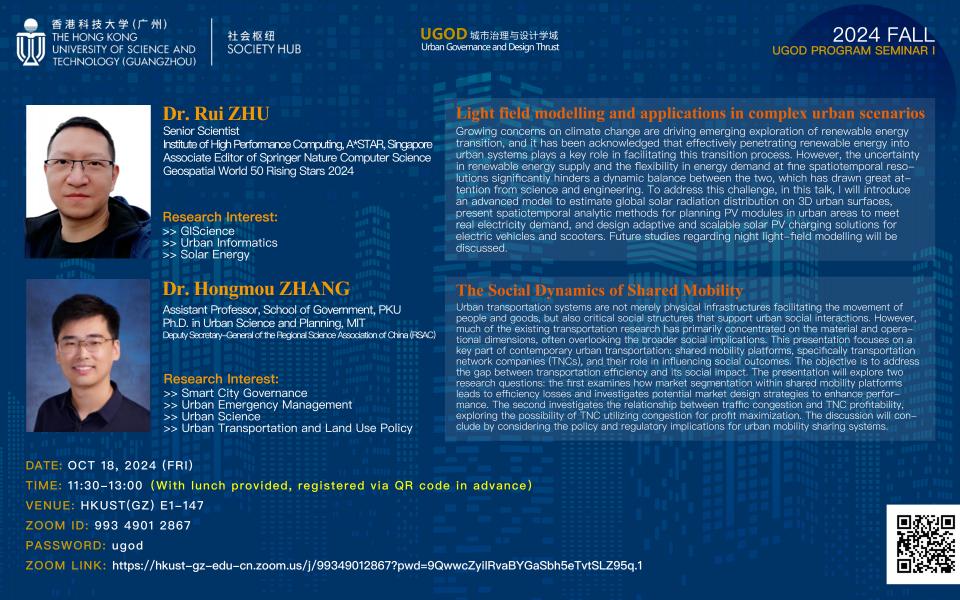UGOD Seminar | Topic 1: Light field modelling and applications in complex urban scenarios; Topic 2: The Social Dynamics of Shared Mobility
Topic 1: Light field modelling and applications in complex urban scenarios
Growing concerns on climate change are driving emerging exploration of renewable energy transition, and it has been acknowledged that effectively penetrating renewable energy into urban systems plays a key role in facilitating this transition process. However, the uncertainty in renewable energy supply and the flexibility in energy demand at fine spatiotemporal resolutions significantly hinders a dynamic balance between the two, which has drawn great attention from science and engineering. To address this challenge, in this talk, I will introduce an advanced model to estimate global solar radiation distribution on 3D urban surfaces, present spatiotemporal analytic methods for planning PV modules in urban areas to meet real electricity demand, and design adaptive and scalable solar PV charging solutions for electric vehicles and scooters. Future studies regarding night light-field modelling will be discussed.
Topic 2: The Social Dynamics of Shared Mobility
Urban transportation systems are not merely physical infrastructures facilitating the movement of people and goods, but also critical social structures that support urban social interactions. However, much of the existing transportation research has primarily concentrated on the material and operational dimensions, often overlooking the broader social implications. This presentation focuses on a key part of contemporary urban transportation: shared mobility platforms, specifically transportation network companies (TNCs), and their role in influencing social outcomes. The objective is to address the gap between transportation efficiency and its social impact. The presentation will explore two research questions: the first examines how market segmentation within shared mobility platforms leads to efficiency losses and investigates potential market design strategies to enhance performance. The second investigates the relationship between traffic congestion and TNC profitability, exploring the possibility of TNC utilizing congestion for profit maximization. The discussion will conclude by considering the policy and regulatory implications for urban mobility sharing systems.
Dr. Rui Zhu is a Senior Scientist at the Institute of High Performance Computing, A*STAR, Singapore. Zhu was a Research Assistant Professor at The Hong Kong Polytechnic University and a Postdoctoral Associate at MIT Senseable City Lab. Zhu’s study focused on GIScience, Urban Informatics, and Solar Energy with more than 70 SCI papers published in journals such as IJGIS, TGIS, The Innovation, Science Bulletin, and Applied Energy. Zhu is an Associate Editor of Springer Nature Computer Science, Editor of Big Earth Data, Energy 360, Advances in Applied Energy, and Young Editor of The Innovation. He is also the PI/Co-I for several research grants, and Board of Director member of CPGIS. Zhu was the awardee of Geospatial World 50 Rising Stars 2024, Top 10 Science Advancement (2024, 3/14), Top 10 most valuable remote sensing datasets (2023, 7/12), etc. His study has been reported by Singapore TV, Lianhe Zaobao, and MIT News. https://felix-rz.github.io/
Dr. Hongmou Zhang is an Assistant Professor at the School of Government of Peking University. His current research interests focus on smart city governance, urban emergency management, urban science, and urban transportation and land use policy. By combining interdisciplinary theories and approaches from applied mathematics, computer sciences, public management, urban studies, and geography, he uses models and simulation tools to answer urban policy questions. Hongmou holds dual bachelor's degrees in Urban Planning and Applied Mathematics from Peking University, a master's degree in City Planning from the University of Pennsylvania, and a PhD in Urban Science and Planning from Massachusetts institute of Technology. He is a Deputy Secretary-General of the Regional Science Association of China (RSAC), and a member of the International Research Society for Public Management (IRSPM).
Please scan the QR code for registration
